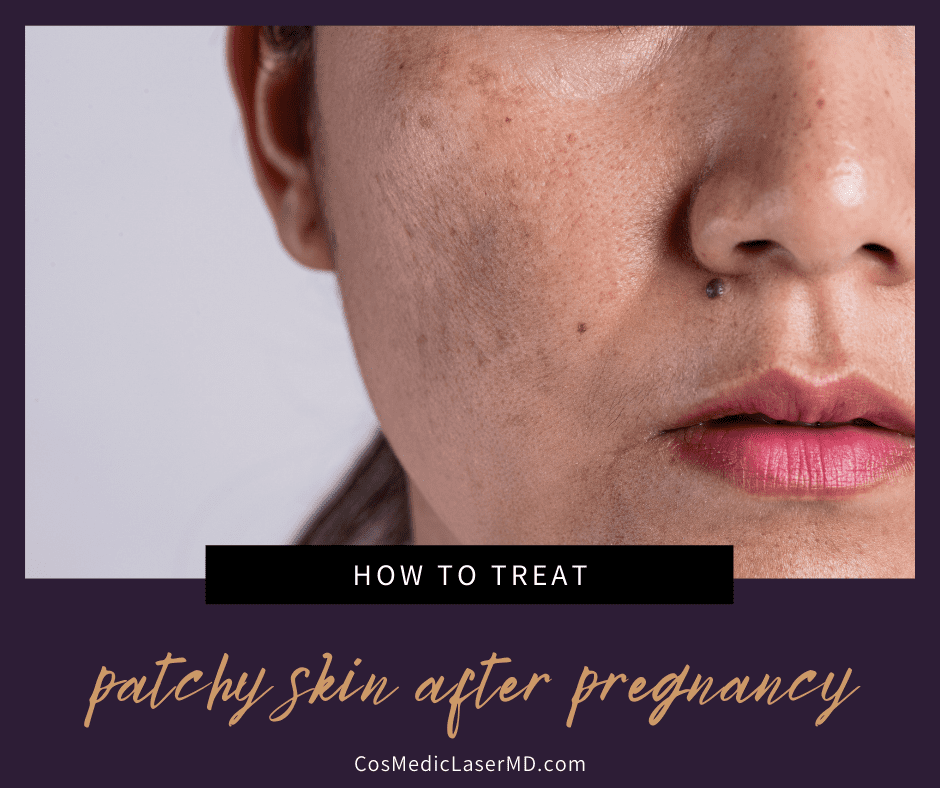
It’s very common for women to suffer from melasma – a skin condition that creates brown or blue-gray patches on the skin. In fact, it often affects pregnant women, and the condition may stick around long after the baby is born. Fortunately, there are cosmetic treatments you can undergo if your melasma is making you self-conscious.
What is Melasma, During and After Pregnancy?
Melasma is a very common skin disorder that causes brown and blue-gray patches on the skin. These patches can be flat or look like freckles, and they most often occur on the face and forearms. The spots may darken or lighten over time, and they can get worse in the summer and improve during the winter.
The condition itself is harmless and doesn’t lead to cancer – but it can make you feel self-conscious about your appearance. It can also be permanent. Some people have melasma for several years, and some people have it for life.
Related: How a HydraFacial can get rid of fine lines and wrinkles
The Three Types of Melasma
There are three types of melasma and your treatment options depend on the depth of the pigment in your skin. These are the three types:
- Epidermal melasma it’s typically dark brown, and the spots have well defined borders. Sometimes, epidermal melasma responds well to treatment.
- Dermal melasma can be light brown or blue, and typically, the borders are blurry. This type of melasma doesn’t usually respond well to treatment.
- Mixed melasma. Mixed melasma is the most common, featuring blue Gray patches and brown patches. This type does usually respond to treatment.
It’s important to note that there may be other causes for patchy skin after pregnancy. The only way to find out why your skin has become patchy is to talk to your doctor.
Related: Can you do anything about dark circles under your eyes?
Is Melasma or Patchy Skin After Pregnancy Common?
Melasma is surprisingly common, particularly among pregnant women. Up to 50 percent of pregnant women get it, and up to 33 percent of the general population may also suffer from it. This disorder usually shows up between 20 and 40 years of age – during a woman’s reproductive years.
Other Causes of Melasma (Besides Pregnancy)
Though pregnancy is one of the most common causes of this skin condition, there are several medications that can cause it, as well. Some medical conditions, such as hypothyroidism, can cause it, as can using certain skin care products, birth control, some types of makeup, and even using tanning beds.
Related: The best acne scar treatments
Who’s More Likely to Get Melasma and Patchy Skin After Pregnancy?
People who have darker brown skin and those who tan well are more likely to get melasma than fair skinned people are. However, pregnant women get it far more often than anyone else does. (And for the record, women are far more likely to get it than men are – only around 10 percent of people who have it are men.)
How Can You Treat Melasma After Pregnancy?
There are several options you and your doctor can explore for treating melasma. Some of those options include:
- Chemical peels. Chemical peels treat the outermost layer of the skin, and if that’s where your melasma is located, you may see success with this type of treatment.
- HydraFacial. This facial treatment can rejuvenate your skin cells, diminish fine lines, and even light in areas that have darker pigmentation. Sometimes doctors use these facials in conjunction with chemical peels for better results, but every case is different.
- Laser therapy. Your doctor has access to a melanin-specific laser system that can lighten or erase pigmented areas of your skin.
How Do You Find Out Which Treatment is Right for You?
The best way to figure out what treatment will be best for your melasma is to sit down with a doctor and talk about your options. The doctor will need to look at your skin to determine what type of melasma you have (epidermal, dermal or mixed) to help define the right treatment options for you.
Ready to Talk About Patchy Skin as a Result of Melasma?
Our Ann Arbor med spa can help you get the look you want, from clear and youthful skin to fat reduction. Call or text us at 734-249-8722 or fill out the form below to get in touch.


